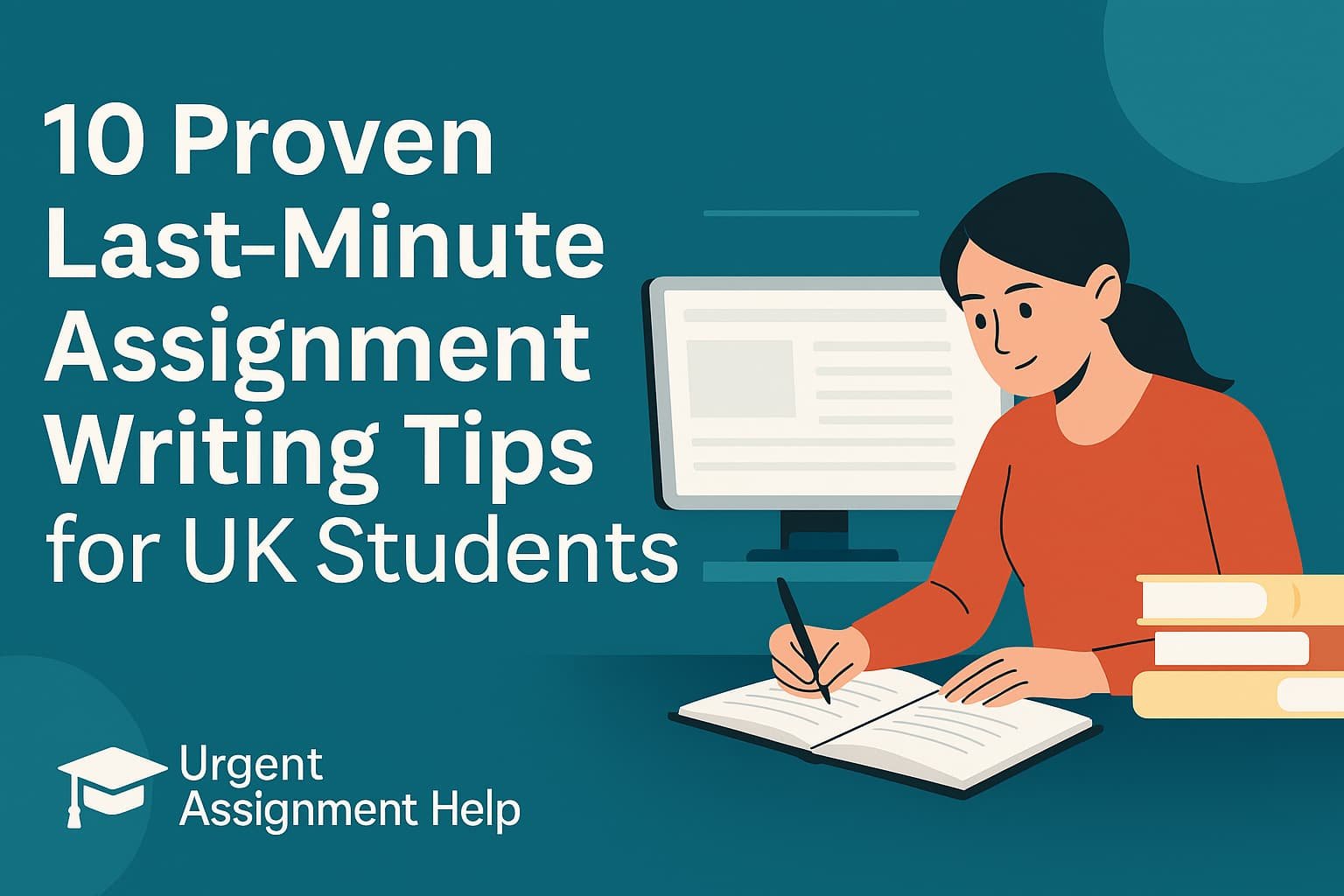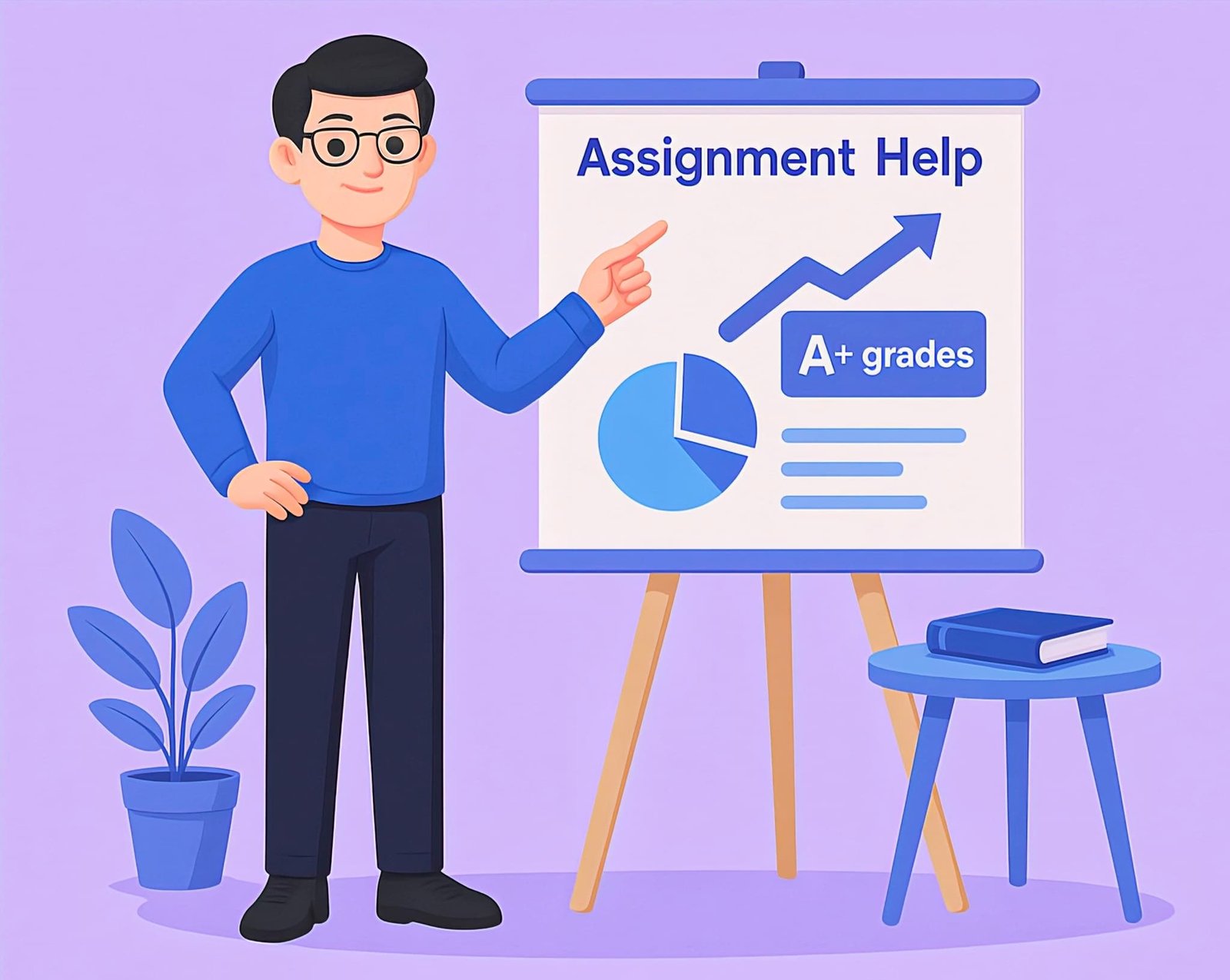10 Proven Last-Minute Assignment Writing Tips for UK Students to Ace Tight Deadlines
Introduction: The Struggle with Last-Minute Assignments in the UK
Every UK student has faced the stress of a looming deadline. Whether it’s due to part-time jobs, family obligations, or simply underestimating how long an assignment would take, last-minute writing is a reality. But just because you’re short on time doesn’t mean your grades have to suffer. With the right strategies and mindset, it’s possible to complete assignments efficiently while still maintaining academic quality. In fact, many students have discovered that urgency can sometimes unlock deep focus and clarity. The key is knowing how to channel that pressure into productivity. That’s what this guide is about—equipping you with 10 proven tips to conquer last-minute assignment writing with confidence and structure.
- Need expert help? Visit Urgent Assignment Help for 24/7 assistance.
- Also check Instant Assignment Help UK for subject-specific support.
- Learn why thousands of UK students trust Assignment Help Zone.
Tip 1: Start with a Clear, Time-Blocked Plan
When you’re short on time, planning may seem like a luxury you can’t afford. But the truth is, even 15 minutes of structured planning can save you hours later. Break your time into manageable blocks—for example, 30 minutes for research, 1 hour for writing, 20 minutes for editing. Use tools like Pomodoro timers or time-blocking planners to hold yourself accountable. Prioritise the most marks-heavy sections first, such as your introduction, argument, or case analysis.
- Read this University of Leeds productivity guide.
- Try free planning tools like Trello or Google Calendar.
- Check our dedicated assignment management tips blog post.
Tip 2: Understand the Assignment Brief Thoroughly
Before writing anything, read your assignment brief at least twice. Many UK students lose marks not because they wrote poorly, but because they misunderstood the question. Look for keywords like “discuss,” “analyse,” or “critically evaluate.” Check the word count, referencing style (Harvard, APA, MLA), and submission format. This ensures that you’re meeting university expectations from the outset and not wasting time on irrelevant content.
- Refer to this Open University guide on assignment briefs.
- Need help decoding complex briefs? Visit My Assignment Help UK.
- Download our UK brief checklist PDF to avoid mistakes.
Tip 3: Gather Research from Trusted, Quick Sources
In a rush, many students default to Wikipedia or random blogs. Instead, use high-quality sources that are both quick and reliable. Google Scholar, JSTOR, or your university’s online library are excellent for accessing peer-reviewed content. Don’t aim for 10 sources if 5 well-cited journal articles will suffice. Save time by reading abstracts first before diving into the full article. Use citation tools like Zotero or Mendeley to manage references efficiently.
- Access free research at Google Scholar.
- Explore premium articles on JSTOR.
- Need help with citations? Visit our Harvard referencing guide.
Tip 4: Create a Bulletproof Assignment Structure
A solid structure saves time and improves clarity. Every academic assignment, from essays to case studies, follows a standard flow—introduction, main body, conclusion. Use subheadings to divide content logically. Start with topic sentences and supporting arguments. Add evidence and examples from your research, and conclude each section with a brief reflection or transition. A rough skeleton helps you stay focused and reduces writer’s block.
- View sample structures at University of Manchester Writing Centre.
- See a live template from UK Assignment Help.
- Download our free assignment structure worksheet.
Tip 5: Use AI Tools Responsibly and Ethically
AI writing tools like Grammarly, QuillBot, and ChatGPT can enhance productivity when used wisely. For instance, Grammarly helps spot grammar issues instantly. QuillBot can assist with paraphrasing tricky sentences. But never use AI to generate entire essays—it risks plagiarism and violates academic integrity. Always cross-check AI-suggested content with your research and ensure it reflects your own understanding.
- Learn ethical AI usage from UK Academic Writing blog.
- Try Grammarly for fast proofreading.
- View our AI & plagiarism compliance policy at Urgent Assignment Help.
Great! Let’s continue with the rest of the high-quality, SEO-optimised blog content.
Tip 6: Avoid Plagiarism at All Costs
Plagiarism is a serious academic offence in UK universities, and even unintentional copying can lead to disciplinary action. To avoid it, paraphrase your research in your own words, always cite your sources, and use plagiarism detection tools before submission. Tools like Turnitin and Grammarly Premium can help identify accidental similarities. If you’re quoting directly, use proper quotation marks and reference styles. Developing a habit of note-taking in your own words can also save you from last-minute panic.
- Check your content with Turnitin Checker.
- Use Grammarly’s plagiarism checker for fast scanning.
- Explore our Plagiarism-Free Assignment Help service.
Tip 7: Write a Strong and Focused Introduction
Your introduction sets the tone and direction of your assignment. A good one includes a brief background, the scope of discussion, and a clear thesis statement. Don’t try to write the perfect intro first—start with a rough version, then refine it later. Many students find it easier to write introductions after completing the main body. Keep it concise but informative, ideally 10–15% of your total word count. Use clear, academic language and avoid vague phrases.
- Learn intro writing from University of Sussex Writing Lab.
- See sample introductions at UK Assignments.
- Download our free Introduction Writing Template.
Tip 8: Edit and Proofread Like a Professional
Editing is not just about fixing typos. It involves refining sentence structure, improving argument flow, and ensuring coherence. Start by reading your assignment aloud—this helps spot awkward phrasing. Use editing tools like Hemingway Editor to identify overly complex sentences. Take short breaks between writing and editing for a fresh perspective. If time allows, get a peer or tutor to review it. Don’t underestimate the power of a well-edited assignment—it could be the difference between a 2:2 and a 1st.
- Try Hemingway Editor for clear writing.
- Use Grammarly for grammar and syntax fixes.
- Access expert editing from Urgent Assignment Help.
Tip 9: Customise Content for Specific Subjects
Different subjects demand different approaches. A law essay requires case law references and structured arguments, while a nursing assignment might prioritise patient care frameworks and ethical considerations. Tailor your tone, vocabulary, and examples accordingly. Understand what your specific department values—some prefer critical theory, others value real-world application. Reviewing previous top-graded assignments in your subject can also help you align with expectations.
- View nursing samples on Nursing Assignment Help UK.
- Get subject-specific tips from MyAssignmentHelp UK.
- Visit Law Essay Writing UK for legal assignments.
Tip 10: Know When to Ask for Professional Help
Sometimes, no amount of planning or productivity hacks can replace expert assistance. Whether you’re battling burnout or juggling multiple deadlines, it’s okay to seek urgent academic support. Services like Urgent Assignment Help offer 24/7 expert writers across subjects with plagiarism-free guarantees. Just ensure that any help you seek maintains academic integrity—aim for guidance and drafts, not full ghostwriting.
- Order urgent help from Urgent Assignment Help UK.
- Explore live chat support at Assignment Help Zone.
- View testimonials from UK students here.
Final Word: Turn Chaos Into Confidence
When a deadline’s just hours away and panic kicks in, it’s easy to feel defeated. But this guide has armed you with tools that UK students swear by—tools that work even when you’re running on zero sleep and five tabs open. These aren’t just strategies—they’re lifelines built for real academic pressure.
Why these tips matter:
- They’re proven by students across the UK
- They save you from burnout and failure
- They’re built around UK university guidelines and expectations
Don’t just skim and scroll—use them. Apply even half, and you’ll start noticing better results, fewer stress spirals, and stronger grades.
Keep This 10-Step Toolkit Handy
All 10 tips you just read are designed to work under pressure. They’re fast, repeatable, and perfect for last-minute study sessions. The best part? You don’t have to memorise them all—we’ve created a clean, visual summary that you can refer to anytime.
What’s inside the visual guide:
- A downloadable checklist with each of the 10 steps
- Mobile-friendly format for quick reference
- Designed for UK university standards
🔗 Click here to get the free infographic from our Visual Resources Page
Print it. Bookmark it. Stick it on your wall. Whatever keeps it close—do it.
Still Overwhelmed? We’ve Got You Covered
Let’s face it—sometimes, even the best tips aren’t enough. Life happens. You fall sick, double-book your schedule, or hit a creative block. That’s exactly why Urgent Assignment Help exists. We’re not just here to “do your assignment.” We’re here to rescue your grade when you’re out of time but still want to stay ahead.
What we offer UK students:
- 💡 Plagiarism-free, custom-written assignments—Turnitin safe
- 📚 Subject-specialist writers in law, nursing, business, and more
- 📲 24/7 WhatsApp support for urgent requests or progress updates
We’re trusted by students across the UK—from first-years at Coventry to postgrads at Manchester. And we never miss a deadline.
Action Beats Anxiety: Take the Next Step
Reading tips is great. Applying them is better. But when the pressure’s on and time’s almost out, don’t freeze. Choose action. That might mean using this blog as a checklist—or dropping us a message so we can take it from here.
Here’s how to reach out fast:
- 📩 Email: uk@urgentassignmentshelp.com
- 💬 Live Chat: Visit us now
- 📱 WhatsApp: Chat instantly
Still wondering if it’s worth it? One well-written assignment could boost your GPA. Could land you an internship. Could be the difference between a 2:2 and a First.
This Isn’t Just a Blog—It’s Your Assignment Lifeline
Let’s be clear: this guide wasn’t written to entertain. It was built to rescue your grades. To turn chaos into structure. To replace all-nighters with smart shortcuts.
Here’s what sets this blog apart:
- It’s based on UK university grading criteria
- It addresses your real challenges—tight deadlines, stress, and quality
- It gives you professional options when you need support
So what now? Save this page. Share it with your group chat. And when the next deadline hits, don’t waste a second. Either follow the tips—or delegate to the experts who know the pressure you’re under.




Stuck with online assignment help UK? Contact Casestudyhelp.net offers the top-rated assignment help for College or university students. They cover all kinds of assignments, including Management Assignment, Strategic Management Assignment, and Business Management Assignment, etc., with AI-free and Pilgrim-free content.
Can you be more specific about the content of your article? After reading it, I still have some doubts. Hope you can help me.
Coursework deadlines can get stressful very quickly, especially when multiple subjects demand attention at the same time. Getting reliable Finance assignment help can really ease the pressure and help you stay organised.